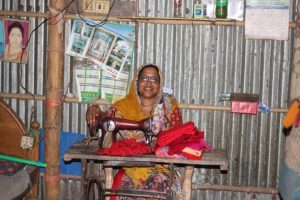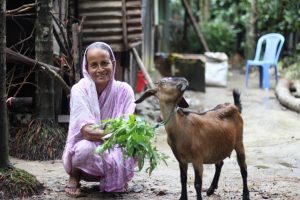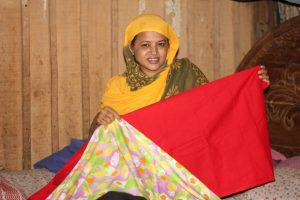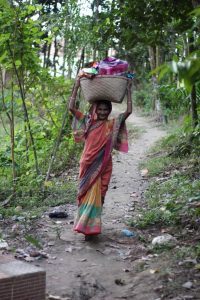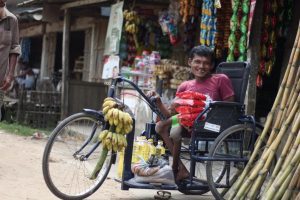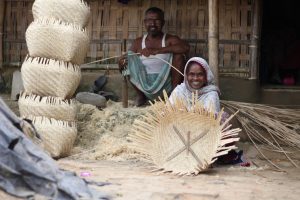The protracted Rohingya refugee crisis has posed undeniable challenges for the host community in Cox’s Bazar, placing considerable economic, social, and environmental pressure on local livelihoods. Yet, within these challenges lies a story of resilience, determination, and renewed opportunity.
With support from Aktion Deutschland Hilft (ADH) and Arbeiter-Samariter-Bund (ASB), the Centre for Disability in Development (CDD) implemented a project that placed inclusion and community health at its centre. The initiative provided small-scale livelihood support to persons with disabilities, single women, and women from ethnic minority groups, enabling them to strengthen their income-generating activities and reclaim their economic independence.
The selection of participants was not arbitrary but built upon rigorous assessments and inclusive dialogue. Factors such as prior skills, household economy, gender, disability status, and market demand were carefully considered to ensure each livelihood was both suitable and sustainable. Alongside this, participants also received health services—including eye care, essential medicines, assistive devices, and referrals—recognising that good health underpins the ability to work productively and live with dignity.
This holistic approach did more than deliver short-term aid; it empowered individuals to reassert control over their lives. The following stories illustrate how the project nurtured agency, resilience, and hope within the host community.
Fatema Begum: A Mother with an Unyielding Spirit
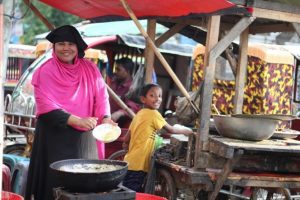 At 34, Fatema Begum is not only an educated mother of three but also the driving force behind her household. Widowed and carrying the full responsibility of her children’s education, household expenses, and debts, Fatema refused to be defined by hardship.
At 34, Fatema Begum is not only an educated mother of three but also the driving force behind her household. Widowed and carrying the full responsibility of her children’s education, household expenses, and debts, Fatema refused to be defined by hardship.
Recognising her determination, the project provided her with essential food items and a stove to expand her street food business. Each afternoon, Fatema now sells hot meals from her van along the busy roads of Ramu, proudly standing as the only woman among the male street vendors at the station. Her presence itself is a quiet act of defiance against gender norms, and her success is an example of what women entrepreneurs can achieve when given the right support.
Through the CDD’s health camp, her late husband was also able to access treatment for diabetes—a reminder of how integrated health and livelihood support can strengthen entire families.
Despite her daily challenges, Fatema looks ahead with hope. She dreams of seeing her daughter play for the Bangladesh National Women’s Football Team and actively encourages her passion for sports. Her food business has become more than a livelihood; it is a collective family effort that symbolises love, resilience, and ambition.
In Fatema’s words:
“I am grateful for the help I received. Being the only woman among all the male street sellers at Ramu station makes me proud. I want to see my little daughter playing for the Bangladesh National Women’s Football Team.”
Jasim Uddin: Rebuilding Life with Dignity
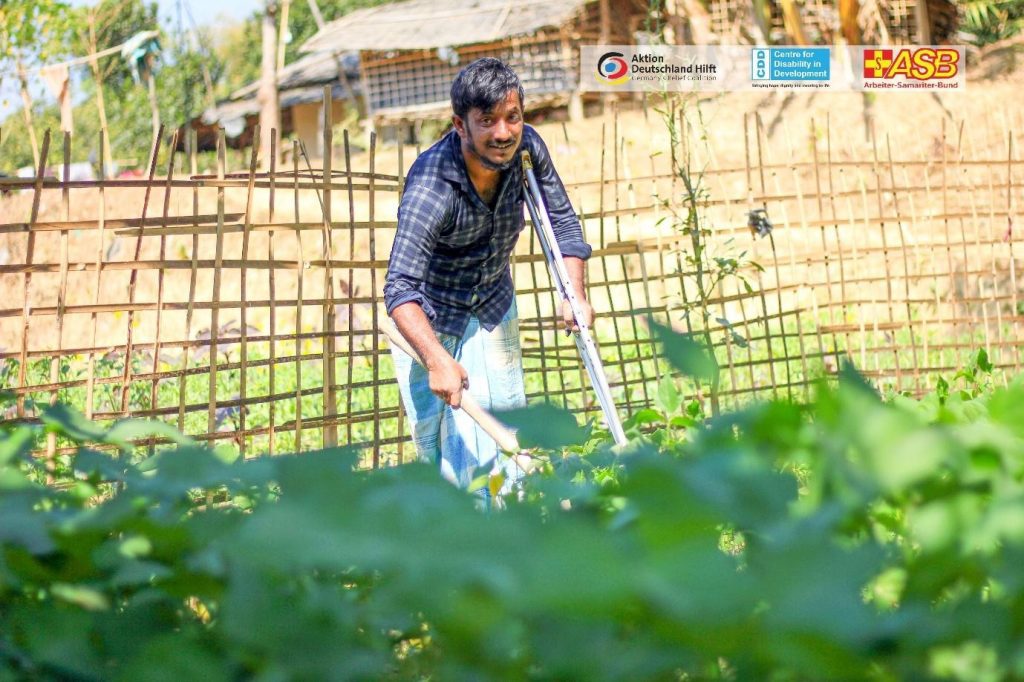 Jasim Uddin, 43, has shown remarkable strength in the face of life-altering adversity. In 2020, while collecting bamboo near the Bangladesh–Myanmar border, he stepped on a landmine, losing his right leg. The pandemic and financial hardship prevented him from receiving proper treatment, and for years he relied on an unsuitable wooden stick to move around.
Jasim Uddin, 43, has shown remarkable strength in the face of life-altering adversity. In 2020, while collecting bamboo near the Bangladesh–Myanmar border, he stepped on a landmine, losing his right leg. The pandemic and financial hardship prevented him from receiving proper treatment, and for years he relied on an unsuitable wooden stick to move around.
In October 2024, Jasim received a pair of crutches through the project, opening a new chapter in his journey. For the first time since the accident, he was able to walk independently without pain. With mobility restored, he tends to his homestead garden, producing vegetables for his family and rebuilding his life with dignity.
In his own words:
“My crutches are great. It took a lot more effort to move around with a stick. Thanks to the help I was given, I can walk independently without limping. I am not uncomfortable anymore, and the pain has disappeared! I can tend to my homestead garden to produce vegetables for my family.”
Recognising Jasim’s determination, the project also supported him with a goat to restart small-scale livestock rearing—a livelihood he can manage with the help of his niece. This support reflects not charity but an investment in Jasim’s resilience and his ability to provide for his family once more.
Kalpana: Building a Dream Business
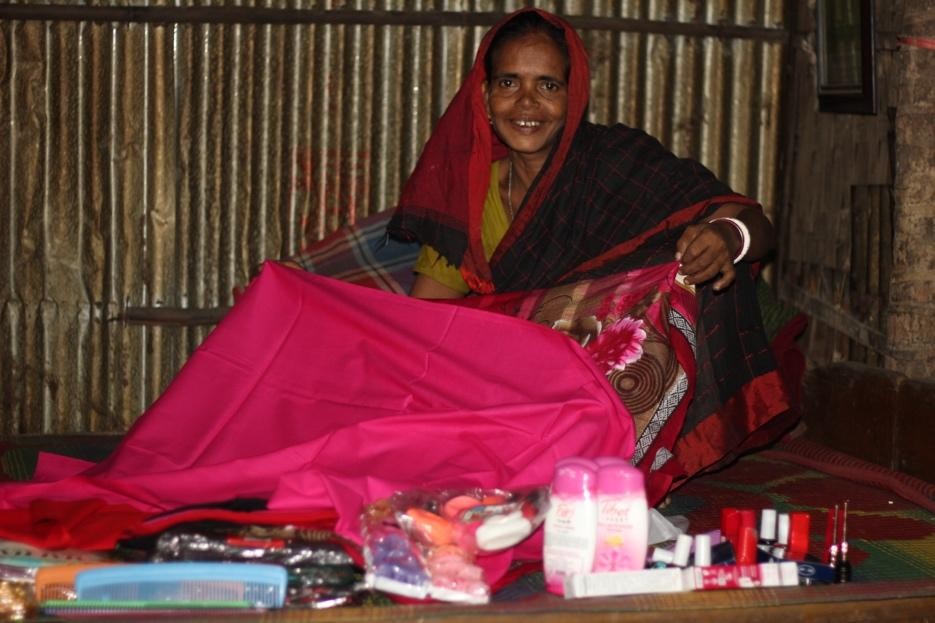 At 56, Kalpana had long dreamt of running her own small business. Through the project, she received materials worth BDT 10,225—including sarees, fabrics, stitched dresses, and cosmetics—to start a home-based venture. She also benefitted from an eye camp in her village, where she was provided with medicine and a pair of glasses that significantly improved her vision.
At 56, Kalpana had long dreamt of running her own small business. Through the project, she received materials worth BDT 10,225—including sarees, fabrics, stitched dresses, and cosmetics—to start a home-based venture. She also benefitted from an eye camp in her village, where she was provided with medicine and a pair of glasses that significantly improved her vision.
Kalpana now proudly runs her business from home, supporting her family as their main earner. In her words:
“I have struggled with my eyesight for years, but with treatment and glasses my vision is much better. I can now run a small business from home, something I dreamt of for a long time. This makes me truly happy.”
Ebadul: Reviving a Tailoring Trade
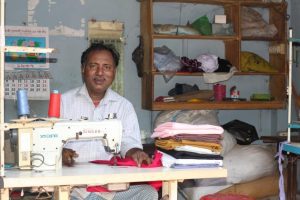 A skilled tailor, 45-year-old Ebadul had been struggling with a long-term health condition that limited his ability to work long hours. Despite his expertise, he could only earn a modest income working in another tailor’s shop. With support from the project, he was able to restart his own business by purchasing fabrics and sewing materials.
A skilled tailor, 45-year-old Ebadul had been struggling with a long-term health condition that limited his ability to work long hours. Despite his expertise, he could only earn a modest income working in another tailor’s shop. With support from the project, he was able to restart his own business by purchasing fabrics and sewing materials.
Today, customers visit him directly to buy cloth or order stitched garments, enabling him to keep all his profits and plan for growth. He explains:
“I started this small cloth business to improve our family’s finances, and I am happy with the results. My goal now is to re-establish my own tailoring shop and provide a better future for my family.”
Niva: From Setback to Self-Reliance
Twenty-one years ago, Niva left her abusive, drug-addicted husband and returned to her father’s house with her son. She just could not sit idle. Determined to be self-reliant, Niva took on various jobs, including farming, working on government projects like road and drain constructions, and repair. However, years of hard work led to kidney problems, forcing her to take a loan of BDT 3,00,000 which is still unpaid. Niva used to sew clothes, but difficulty in seeing close objects and headaches, forced her to stop sewing. On the other, she has high blood pressure and arthritis. Despite her willingness to earn her own bread and butter, poor health prevented Niva from making her own income.
After receiving livelihood support Niva expresses:
“I cannot work like before in the field. I received free eye treatment and started a small business, for which I am truly grateful. Now, from the comfort zone of my home, I sew and sell clothes. There are many women in my community who would like to buy fabrics by their choice. I am planning to grow my business further.”
Danu: Sustaining Her Family with Goat Rearing
Danu has been working tirelessly to support the expenses of her family. Since the demise of her husband 20 years ago, she has been looking after her two grown-up boys who have mental health needs.
She has experience in different short-time works in the community under the government’s rural development programme for the low-income people. She never shied away to work outside, together with males i n the community.
But, at the age of 58, the pace of her life is slow because of her eye irritation and headache. Her eyes were treated when she came to CDD’s eye camp where she received required medicines and spectacles. Recognizing her hard work and experience, Danu was provided with a Black Bengal goat. This initiative is aimed at improving her family’s financial situation by giving her an opportunity to start a small goat-rearing business.
In her words, “I am very happy to receive the Black Bengal goat. Growing goats doesn’t take much time or effort while staying at home. I can give more time to my both sons.”
Anwara: Stitching Independence Through Quilt-Making
Anwara is a 43-year-old woman with a physical disability. She lives with her elder sister, Senuara, after the death of their parents seven years ago. Due to her disability, Anwara could not even get married. She used to facilitate a local group of persons with disabilities.
Anwara suffered from severe eye issues, including blurred vision (cataracts). These problems made it difficult for her to live independently. After assessing her quilt-making skill, she was given support to reinforce her home-based earning option. Prior to that, she had her eyes treated by going through cataract surgery and needful medications.
In the words of Anowara, “My poor eye sight troubled me to make embroidery quilts while using needles and threads. After doing cataract surgery on both of my eyes, now I can again do that without any difficulties. As a woman with a disability, I always strive to be self-reliant by doing home-based work. Quilt-making is perfect for me, and I’ve received the right guidance to grow it. I am hopeful for the future.”
Madhuri: Keeping Traditions Alive
Madhuri, a 52-year-old woman Ferriwallah (hawker), whose earning trade is going door-to-door to sell items in the village. These days it is a vanishing occupation in the community. She has to share the expenses of the family together with her only son.
Madhuri said, “Every day from morning to late afternoon, with my schedule route map, I walk while carrying fabrics, stitched cloths and cosmetics on my head and yelling out for women in the villages who are my customers. I did not want to loan money either as paying back would come with lots of interest to the lender. I am happy that I can contribute to my family even at this age.”
Shipon: Gaining Mobility and Independence
Shipon (32), a male with disability, walks with both hands since both of his limbs are weak from the time he was eight years old. He has been managing his daily-life activities with this condition. He had no formal or informal education about the benefits of using assistive devices to ease his daily activities. In this community, there is no development organization too who advocates for rights of persons with disabilities and promotes awareness.
After knowing all these, a thorough assessment was done for Shipon and he was assisted with a Tri-Cycle from the project and a Toilet Chair. During the monsoon time, when all areas of his village went under water including the place of latrine, Shipon could use the toilet chair.
Shipon says, “I am sincerely thankful to the people for whom I received this Tri-Cycle. Traveling for business has become much easier now for me. It becomes much easier for me to carry grocery items and dry foods in the market place by myself. It does not need extra cost to avail an auto-rickshaw to carry these products too. The toilet chair has also been a big help, as the toilet is a little bit far from the house, and it was very difficult for me to reach the latrine during the monsoon flood time.”
Mushtaq: Regaining Sight, Restoring Dignity
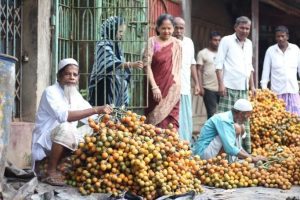 Mushtaq (61) is a betel nut seller from Ramu. Mushtaq faced two losses in his betel nut business, which left him mentally devastated and without any capital to continue. He could not have the much-needed cataract surgery to improve his blurred vision. Being an elderly member of an impoverished family at a rural area, he has no other choice but to earn some money so that his dignity won’t be compromised when living together with the family of his son.
Mushtaq (61) is a betel nut seller from Ramu. Mushtaq faced two losses in his betel nut business, which left him mentally devastated and without any capital to continue. He could not have the much-needed cataract surgery to improve his blurred vision. Being an elderly member of an impoverished family at a rural area, he has no other choice but to earn some money so that his dignity won’t be compromised when living together with the family of his son.
This project intervention created access for Mushtaq to access cataract surgery for his both eyes, to receive eye medicines, a pair of spectacles, and free general health check-up by the registered medical doctors. Also, this project has given him another lifeline by allowing him to start his betel selling business in the market.
Mushtaq says: “Eyes are priceless in human life, but I couldn’t afford to treat my eye problems. Once, I bought a product for BDT 120 and gave the seller a BDT 500 note, but he only returned 30 TK and kept the rest. I didn’t realize it. Now, I can see clearly and do my own work. People cannot cheat me anymore. I’ve also received guidance and products to restart my business. I’ve never received this much help for free in my entire life. I am sincerely praying for you all.”
Badsha Mia: Crafting a Future with Bamboo Baskets
Badsha Mia suffers from extremely poor eyesight and can barely see anything clearly. He owns no land and has no source of income. Although he urgently needed a pair of powerful prescription glasses, he could not afford even a visit to the doctor. His wife earns a meager income by working in other people’s homes, which is just enough for the family to survive from day to day.
Finally, under the humanitarian development project implemented by CDD, Badsha Mia got the opportunity to have his eyes examined. He also received a much-needed pair of strong prescription glasses with a durable frame. Additionally, his wife, Monjura Begum were able to collect essential medicine for their respiratory issues from the health camp.
Interestingly, both Badsha Mia and his wife are skilled in crafting bamboo baskets. This skill became the foundation for further support from the CDD-ASB project, which provided them with 12 pairs bundles of bamboo, covering the cost of purchase and transportation to their home. They were also given nylon ropes necessary for weaving the baskets.
Together, the couple sit at home, cutting and shaping the bamboo into fine strips to make baskets. His wife then takes them to sell at the local weekly market.
Badsha Mia shared: “There hasn’t been any cooking at home yet today. Once my wife returns from the market after selling the baskets and buys some groceries, we’ll be able to cook. My pregnant daughter is home today.”
Each of these personal stories reminds us of the remarkable humility and resilience shown by individuals, even when faced with immense hardship. The support provided has not only improved health and livelihoods, but also rekindled hope and the courage to dream again. Host communities continue to endure the economic, social, and environmental consequences of long-term displacement. The presence of Rohingya refugees has altered their situation in largely challenging ways—tragically, they are paying the price for a displacement they did not cause. This is precisely why we work alongside host communities: to foster meaningful change and to support them in rebuilding their lives with dignity. By addressing health and wellbeing alongside livelihood needs—particularly for women, older persons, persons with disabilities, and ethnic minorities—this development partnership has helped strengthen the resilience of rural communities, enabling them to better cope with the impacts of displacement while advancing socio-economic inclusion.

